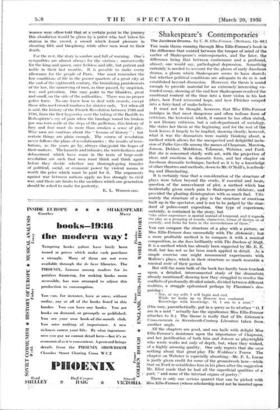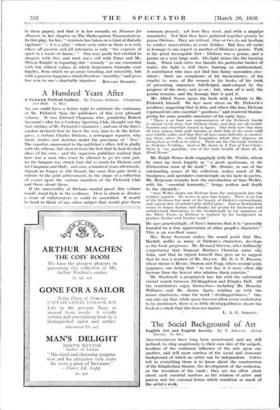Shakesptare's -Contemporaries-
The Jacobean Drama. By E. M. Ellis-Fernaor. (Methuen. 12s.l6)
TUE main theme running through Miss Ellis-Fermor',s book is the difference that existed between the temper of mind of the earlier of Shakespeare's eOntemf.oiaries,' and the later, the difference being that between exuberance and a profound, almost, one would say, pathological depression. Something
certainly is needed to account for the gloom of early Jacobean drama, a gloom which Shakespeare seems .to have shared; but whether political conditions are adequate to do so is not established beyond discussion. However, the thesis is sound enough to provide material for an extremely.interesting ex- tended essay, showing at the end how Shakespeare resolved the emotional content of the time into a finer vision in his last plays, how Ford• recovered hope, and how Fletcher' escaped into a fairy-land of make-believe.
It must not be thought, however, that Miss Ellis-Fermor indulges in that most dangerous and often tedious -form- a criticism, the historical, which, it cannot be too often stated, is not literary criticism, but a sub-department of sociology.
She states her thesis at the beginning, and fin' the rest of the book leaves it largely to be implied, showing clearly, howevek;; what it was the dramatists were mainly thinking about, a method which allows for the unexpected and delightful inclu- sion of Fulke Greville among the -names of Chapman, Marstoa, Jonson, Dekker, Middleton, Tolinieur, Webster, and Ford. But she is concerned chiefly with art, with the projection of ideas and emotions in dramatic form, and her chapter on Jacobean dramatic technique, backed as it is by a knowledge of other theatres and methods, down to Mr. O'Neill's, isrefresfi: ing and illuminating.
It is certainly time that a consideration of the structure of plays were taken beyond the crude, if essential and basic,; question of the unravelment of plot, a method which has.
incidentally given much pain to Shakespeare idolators , and provided the gloating disintegrators with so much fuel. Ulti- mately the structure of a play is the structure of emotions built up in the spectator, and is not to be judged by the stark dard of police-court exposition. One type of experience,' certainly, is contained in the story, but - "the other experience is spatial instead of temporal, and it regards the play as a grouping of moods, characters, forms of diction or of prosody, and looks for form in the interrelations of these." •
You can compare the structure Of a play. with a picture, as Miss Ellis-Fermor does successfully with The Alchemist ; but a more profitable method is to compare it with a musical composition, as she does brilliantly with The Duchess of Mail}., It is a method which has already been suggested by Mr. E. E. Stoll, but has not so far been much applied in detail. Assn simple exercise one might recommend experiments 'with Moliere's plays, which in their structure so much resemble' a' musical suite of their period.
But still the main bulk of the book has hardly been touched, upon, a detailed, interconnected study of the :dramatists. already mentioned! showing how they struggled to resolve the conflicts of profoundly divided minds, divided between different
realities, a struggle epitomised perhaps by Flamineo's des-
pairing : • • .f " Noe, at my selfe I will begin and end.
While we looks up to Heaven wee confound Knowledge with knowledge. 0, I am in a mist." ' •
(One may, parenthetically, put in a query as to whether " 0, I. am in a mist " actually has the significance Miss Ellis-Fermor attaches to it.) The theme is really that 9f Dr. Grierson's Cross-currents in Seventeenth-Century Literature. taken from another angle.
All the chapters are good, and one hails with delight Miss Ellis-Fermors insistence upon the importance of Chapman,. and her justification of both him and Jonson as playwrightli ' who wrote works not only of depth, but, when they wished, of a highly amusing quality. One• only regrets that she says' nothing about that great play The Wjddowe's Teares. The chapter on Webster is especially absorbing—Mr. F. L. Lucas is justly given credit for some of the groundwork here—while that on Ford re-establishes him in his place after the suggestion
Mr. Eliot made that he had all the superficial qualities of a poet, " and none of the internal organs of poetry." .• There is only one serious quarrel that can be picked with Miss Ellis-Fermor (whose scholarship need not be insisted upon
in these pages), and that is in her remarks on Measure for Measure in her chapter. on The Shakesperian Transmutation. In thii play, for her;" cynicism has taken on a" kind of diabolic vigilance " ; it is a play " where such order as there is is evil, where all passion and all enterprise is Only ' the expense of spirit in a waste of shame.' " One'may justly feel entitled to disagree with this, and rank one's self with Pater and Mr. Wilson Knight in regarding this " comedy " as one concerned 'ith fine ethical values, in which forgiveness triumphs over legality, from which we go away brooding, not miserably, but with a pensive happiness which dissolves " morality," and gives free rein to one's charitable impulses. BONAMY DOBRgE.



































































 Previous page
Previous page